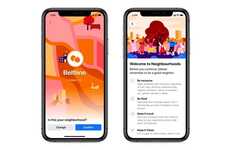
References: news.independent
Social network users are beginning to recognize the potency of their power as grass roots social and political groups are rapidly forming. Just look at what happened this week on Facebook. "Social networking has taken on a radical new edge after a Facebook campaign forced HSBC bank to reverse plans to cancel interest-free overdrafts to new graduates," the Independent reported.
"No longer do eco-warriors have to rely solely on sit-ins and protests. Anti-poverty campaigners now have a platform that allows them to constantly update their message. And local activists can tackle issues such as supermarket expansion plans without leaving their living rooms. Today's revolts are mounted from the mousepad."
Thousands of Facebookers joined the "Stop the Great HSBC Graduate Rip-Off" group, and eventually, after boycotting the bank, they got their point across. HSBC caved, saying they weren't "too big to listen to the needs of customers."
Businesses -- beware. One success tends to lead to another.
US networking site expert, Steve Huff comments on what's going on in North America. "It's a trend that I've noticed over here especially in the last year, where people all over the country form online groups to campaign for a single issue", he said. "I'm not sure yet that they do achieve change, but I would like to think that something can be achieved, if only in establishing a connection between people."
Imagine the power these groups have -- if you thought bullying was bad when you were in high school, imagine what could happen in today's age. If it hasn't happened already, then it's only a matter of time before virtual bullying appears. Imagine the impact a group of "cool kids" could have on some poor, unfortunate "loser." How was Hollywood not written a script like this yet? Like Mean Girls but more web focused. Photos, videos, blogs about rivals or class outcast. And how have the geeks not sought revenge? They have the saavy to defame just about any "popular" kid that has ever treated them badly.
Revenge of the Nerds 2.0, anyone?
"No longer do eco-warriors have to rely solely on sit-ins and protests. Anti-poverty campaigners now have a platform that allows them to constantly update their message. And local activists can tackle issues such as supermarket expansion plans without leaving their living rooms. Today's revolts are mounted from the mousepad."
Thousands of Facebookers joined the "Stop the Great HSBC Graduate Rip-Off" group, and eventually, after boycotting the bank, they got their point across. HSBC caved, saying they weren't "too big to listen to the needs of customers."
Businesses -- beware. One success tends to lead to another.
US networking site expert, Steve Huff comments on what's going on in North America. "It's a trend that I've noticed over here especially in the last year, where people all over the country form online groups to campaign for a single issue", he said. "I'm not sure yet that they do achieve change, but I would like to think that something can be achieved, if only in establishing a connection between people."
Imagine the power these groups have -- if you thought bullying was bad when you were in high school, imagine what could happen in today's age. If it hasn't happened already, then it's only a matter of time before virtual bullying appears. Imagine the impact a group of "cool kids" could have on some poor, unfortunate "loser." How was Hollywood not written a script like this yet? Like Mean Girls but more web focused. Photos, videos, blogs about rivals or class outcast. And how have the geeks not sought revenge? They have the saavy to defame just about any "popular" kid that has ever treated them badly.
Revenge of the Nerds 2.0, anyone?
Trend Themes
1. Grassroots Campaigns - The power of grassroots movements has been proven through successful social media campaigns such as the one against HSBC, and this trend highlights a disruption of political and social change as the power of social media continues to grow.
2. Online Activism - Online activism is growing rapidly when people form online groups to campaign around specific issues and, as a trend that is increasing in North America over the past year, social media is playing a central role in creating new opportunities for disruptive innovation.
3. Virtual Bullying - Social media is becoming a tool for virtual bullying, where groups can create an impact on people or organizations, calling attention to how businesses must take the power of social media seriously and anticipate negative legal and reputational consequences.
Industry Implications
1. Banking - The HSBC campaign shows how social media is driving disruption in the banking industry because changes in policies or practices can be immediately challenged by activist groups with more impact than traditional protest media.
2. Activism - The power of grassroots campaigns and online activism may be an opportunity to create change across all political and social sectors as a result of the more democratic and powerful voices brought through social media.
3. Education - Virtual bullying carried out by activist groups may bring a new level of awareness to schools and universities about the need to teach social media ethics and risk-management skills in this age of information to create a culture of mutual respect and responsible use of social media tools.
4.9
Score
Popularity
Activity
Freshness















